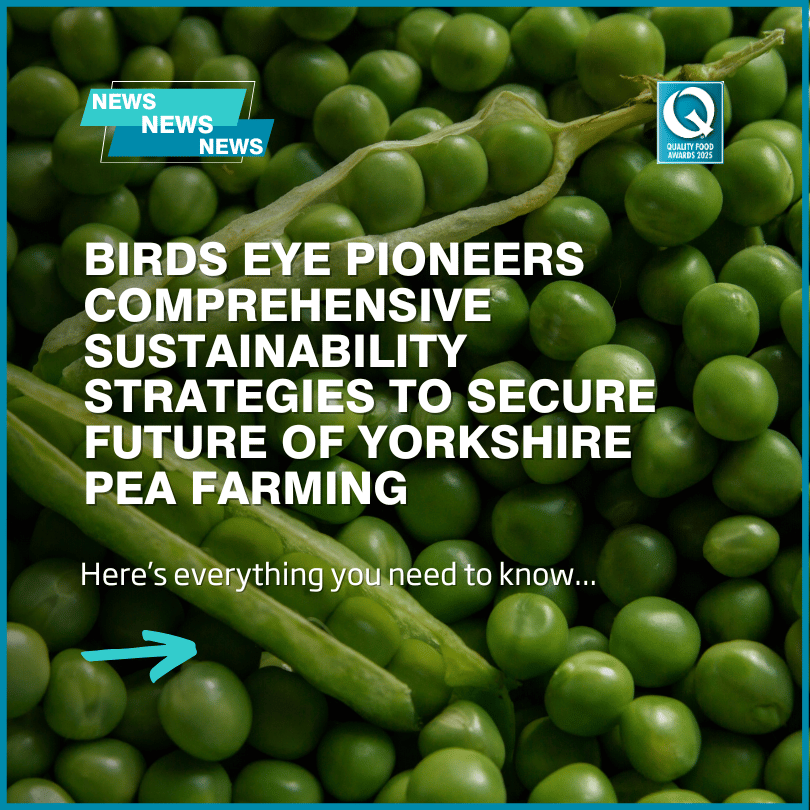
Birds Eye pioneers comprehensive sustainability strategies to secure future of Yorkshire pea farming
Birds Eye has unveiled a multi-faceted approach to sustainable pea cultivation in Yorkshire, integrating advanced breeding, biological solutions, and biodiversity initiatives to secure the future of local farming amid environmental challenges.
Birds Eye, the UK’s leading frozen food company, has long been synonymous with high-quality frozen peas, with its vining pea operations centred around Yorkshire. To secure the future of local pea cultivation for decades to come, Birds Eye has committed itself to pioneering sustainable farming practices designed to boost productivity while preserving soil health and environmental integrity.
Over the past five years, Birds Eye has been actively developing a suite of approaches aimed at raising vining pea yields in a way that is both economically viable for farmers and environmentally sustainable. Central to these efforts is breeding new resistant pea varieties, innovating precision drilling technology, and trialling advanced biological products that reduce reliance on conventional chemical inputs. According to Richard Wilson, Birds Eye’s UK agriculture manager, the company’s signature quality stems from freezing peas within 2.5 hours of picking to prevent fermentation that spoils flavour. This rapid processing requirement limits the radius of pea growers around its factory, further accentuating the need for sustainable, intensive cultivation on available land.
The company’s commitment to sustainability is reflected in its achievement that 100% of its pea growers are verified at silver or higher through the Sustainable Agriculture Initiative (SAI) platform’s Farm Sustainability Assessment. In fact, Birds Eye’s pea farm management group reached the SAI’s Gold Level in 2020—an industry first in the UK and globally within the frozen food sector—highlighting an advanced level of sustainable farming practice. This milestone aligns with the greater ambition set by parent company Nomad Foods to source all vegetables, potatoes, fruit, and herbs via sustainable farming by 2025.
Integral to increasing pea yields sustainably is the extension of crop rotations, a critical measure to mitigate soil pathogen build-up such as foot-rot. Whereas peas were frequently grown in one-in-four rotations in the mid-20th century, Birds Eye now promotes rotations of one-in-six years or longer, with careful soil pathogen testing carried out two years before planting. Samples are analysed at Nomad Foods’ R&D facility in Sweden—a reflection of the company’s global investment in scientific capacity—to identify disease risks and inform planting decisions. Resistant varieties, later drilling to avoid wet soils, and the use of biological fungicides are all employed to further manage pathogen threats.
The Green Pea Company (GPC), which exclusively grows peas for Birds Eye, uses specialized Herriau precision drills that enable exact seed placement and uniform emergence, essential for consistent quality. This spring, a new folding drill was introduced, which is lighter and more fuel-efficient, enabling smaller tractors and reducing soil compaction risks. These innovations underscore Birds Eye’s holistic approach to evolving its agronomy, combining technology with ecological stewardship.
Biological solutions are also a focal point in the ongoing transition from conventional chemical treatments. Birds Eye has trialled and expanded use of Prestop, a biological fungicide derived from natural soil fungi that offers control of key pathogens. Additionally, products such as Rise-P, a soil inoculant containing beneficial Bacillus subtilis bacteria, are applied to improve soil phosphate availability. Other innovations include a photo catalyst foliar spray that converts atmospheric nitrous oxide into nitrate usable by the plant, boosting yields by around 10% while simultaneously capturing potent greenhouse gases. The company is collaborating with the University of Lincoln to quantify the environmental benefits of these approaches, measuring actual greenhouse gas footprints to validate emissions savings.
Wildflower margins around pea fields form part of Birds Eye’s biodiversity commitments. While not mandatory, the company encourages growers to sow seven-species wildflower mixes, free to farmers and compliant with Sustainable Farming Incentive standards, to support pollinating insects and reduce unproductive land. One notable initiative, the ‘Peas For Bees’ campaign, involves dedicating farm areas seeded with native wildflowers, combined with public engagement through art installations to raise awareness of pollinator importance.
Climate change also poses evolving challenges such as increased aphid pressures, which bring virus risks. Birds Eye is adopting integrated pest management strategies, combining natural varietal resistance and geographic insights. For example, fewer aphids are observed on the higher, drier Wolds compared to wetter river valleys, informing potential adjustments in planting and treatment timings. The company is also collaborating with the Processors and Growers Research Organisation on virus surveillance to better target insecticide use.
Beyond field-level innovations, Birds Eye works collaboratively with partners including The Green Pea Company and Yorkshire Water on environmental projects such as the Sustainable Landscapes Humber initiative. This involves over 40 farmers growing cover crops between pea harvest and next sowing, improving soil structure and reducing greenhouse gas emissions significantly. Operational efficiencies are also pursued through real-time telematics across harvesting and logistics, aiming to freeze peas within 150 minutes of picking and guaranteeing freshness.
Collectively, Birds Eye’s multi-faceted approach exemplifies the future of sustainable pulse production, balancing productivity, environmental stewardship, and farmer profitability to ensure the legacy of pea growing in Yorkshire for potentially another 60 years and beyond.
